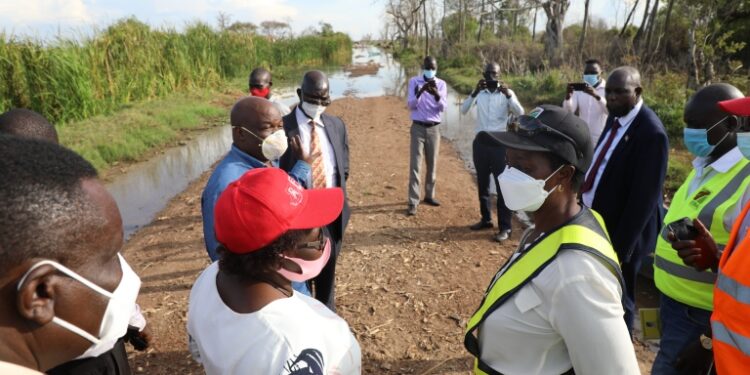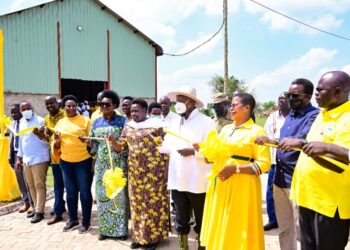By David Muwonge
A cross-section of legislators belonging to the Lango Parliamentary Group (LPG) have called on authorities to prioritize employment of locals in road construction projects across the sub-region.
Judith Alyek, the Chairperson of Lango Parliamentary Group, expressed her displeasure at the low intake of local content from the sub-region.
Alyek stated at a joint meeting between the Legislators and “Mota Engil” the contractor handling the Lira-Kamdini road.
Addressing dignitaries at Boroboro campsite on 29th October 2021, Alyek pointed out that a significant number of those employed in various capacities are alien to the region and from areas like Teso sub-region where the contractor has previously been operating.
“I hardly found one Langi personnel in this camp. I only found one person speaking Luo,” a visibly disturbed Alyek said.
“I was told some people are from Bukedea. They have been transferred here.”
The legislator urged the contractor, Mota Engil, to employ more locals from the area as this would help build a relationship with the community, and in turn improve household incomes.
This was during a separate stakeholders’ meeting held on 30th October 2021 with General Edward Katumba Wamala the Minister Works and Transport, Ms. Allen Kagina the Executive Director UNRA, and a cross-section of political leaders. In a statement, the Lango Parliamentary Group (LPG) presented a petition on the state of roads in the sub-region; with local content among the points of interest.
The statement read in part, “In light of the planned constructions in NDP III and plans in NDP IV, we (Lango Parliamentary Group (LPG) hereby propose a local content of 80% of the labour force in all the planned recruitments in existing and new contracts.”
“In addition, support services and supplies such as catering, fuel, and lubricants should be sourced locally. Contracts for maintenance and rehabilitation of murram (gravel roads) should also be locally sourced.”
In the same breath, a tough-talking Cecilia Ogwal demanded for the declaration of staff composition by the construction companies and prioritization of community interests.
“How do they (indigenous employees) fall in the Organogram of the company? Are they in the management team, are they in the technical team, or are they just ‘survivors’ on the site?” Dokolo Woman MP Cecilia Ogwal questioned.
“This is a very important point because when we are talking about local content, we are not joking. If you bring your project here, take care of our interests. This is a matter that has caused us a lot of pain,” she added.
In response to the claims put before the contractors, Engineer James Olonya speaking on behalf of Sadeem Al Kuwait Construction – upgrading Rwenkunyu-Apac Road (90.9Km) – acknowledged a below-average intake of the indigenous, which he attributed to lack of interest from the locals in the employment opportunities availed.
“There are moments when I have been looking at getting at least 20 engineers and I have shared it in various forums, and I don’t even get responses,” said Olonya.
“Because actually managing people from afar is very costly, it doesn’t make business sense,” he added.
Available information indicates that between 2016/17, the poverty rates in northern Uganda stood at 32.5 percent. Despite a reported reduction, more decisive measures such as youth employment have to be seized with a particular focus on wealth creation and infrastructure development.
General Katumba Wamala, in his closing remarks at the stakeholders’ meeting, noted that the government has always urged contractors to employ as many indigenes as possible. However, the contractors express concerns of theft of material by the locals employed, causing financial loss from both loss of equipment and contractual time.
Katumba, however, recommended to the foreign contractors to outsource employment hiring services to their local compatriots, who will be held accountable in the occasion of any misdemeanors.
Furthermore, Katumba commented: “We need to train our youth to change their attitude towards work so that they are able to benefit from these projects. Otherwise, we encourage these people to employ most of the people from within the local area.”
The stakeholders’ meeting climaxed the Lango roads inspection tour – a continuation of deliberate engagement initiatives by Uganda National Roads Authority (UNRA) with regional Members of Parliament.
Do you have a story in your community or an opinion to share with us: Email us at editorial@watchdoguganda.com













